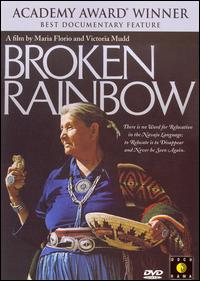| Broken Rainbow | |
|---|---|
 DVD cover | |
| Directed by | Victoria Mudd |
| Produced by | Maria Florio Victoria Mudd [1] |
| Starring | Laura Nyro Buffy Sainte-Marie |
| Narrated by | Martin Sheen |
| Cinematography | Baird Bryant Frederick Elmes Victoria Mudd Tony St. John Joan Weidman |
| Edited by | Joanne D'Antonio Maria Florio Victoria Mudd Vivien Hillgrove |
| Music by | Laura Nyro |
| Distributed by | Earthworks Films [2] |
Release date |
|
Running time | 70 minutes |
| Country | United States |
| Languages | English Navajo |
Broken Rainbow is a 1985 American documentary film by Victoria Mudd and Maria Florio. [3]